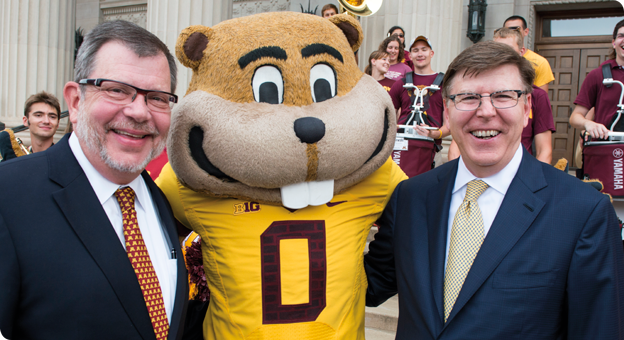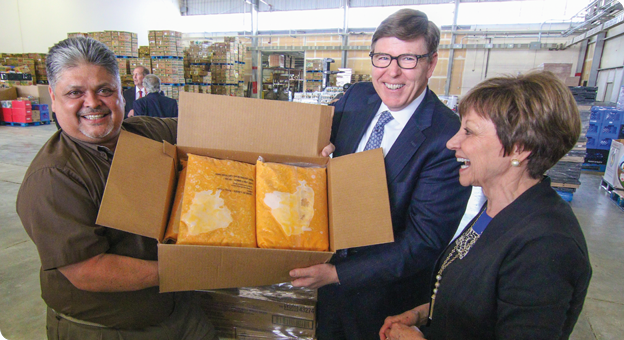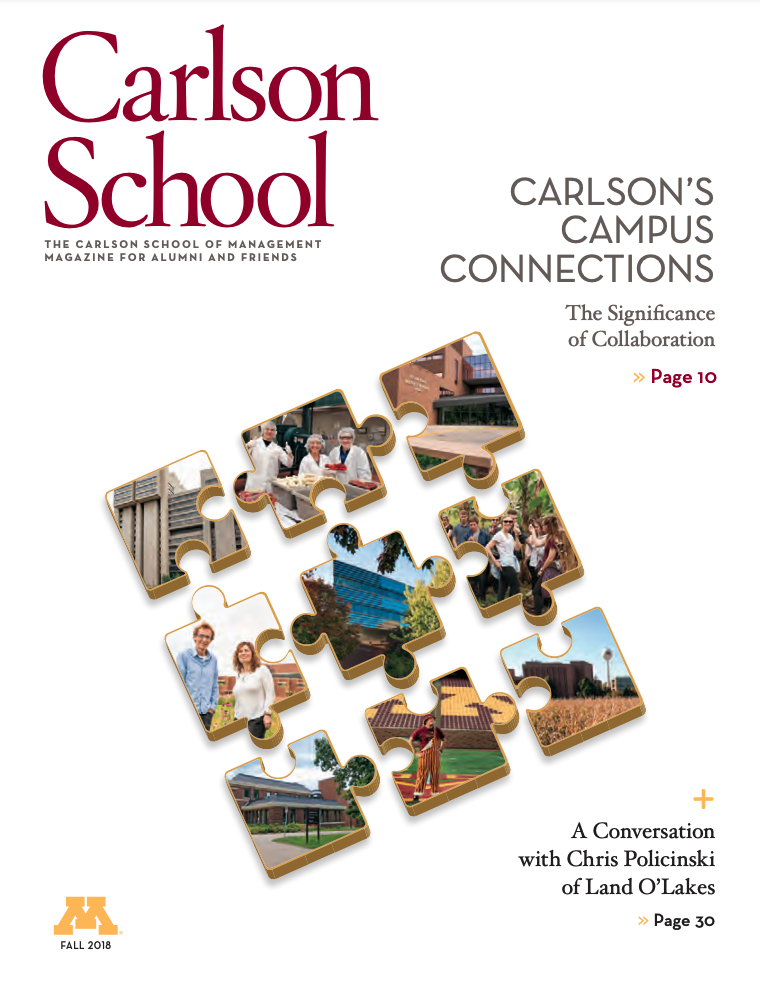
A Conversation with Chris Policinski
Saturday, September 1, 2018
This issue’s guest is Chris Policinski, the recently retired president and CEO of Land O’Lakes, Inc. Policinski has more than 35 years of experience in the food industry. He joined Land O’Lakes, Inc. in 1997 and was appointed president and CEO in 2005. Prior to joining Land O’Lakes, Inc., he held leadership positions with Kraft General Foods, Bristol-Myers Squibb, and The Pillsbury Company. He also is an emeritus member of the Carlson School Board of Advisors.
For several years, you had been a member of the Carlson School’s Board of Advisors, now an emeritus member. What motivated you to donate your time and talent to the school in this way?
I didn’t grow up in Minneapolis-St. Paul, but realized right away when I moved here what a special place it is—18 Fortune 500 companies don’t cluster in a Midwestern city for no reason. I believe one of the main drivers of their interest in the area is the University of Minnesota. I wanted to support the school and become engaged in its talent development for the region to help build for the future.
Board of Advisors members help guide the direction of the school. What are your thoughts about the future of the school and what are you particularly excited about?
It’s probably not fair to say “everything.” But I’m going to say it anyway. I am truly excited about the future of the school and the direction it’s heading.
The University of Minnesota as a whole and the Carlson School, in particular, have received ongoing support from Land O’Lakes over the years, including a $25 million gift to the U in 2014. Why does Land O’Lakes place such high value on its relationship with the University?
Our headquarters is less than 10 miles from the University of Minnesota campus and 20 percent of our employees came out of the U. Land O’Lakes is a growth company in a growth industry and we need talent to fuel that growth. It’s simply a good strategic marriage.
Speaking of your company’s University connections, you recently spoke at the U’s College of Food, Agricultural and Natural Resource Sciences to celebrate the naming of the Land O’Lakes Collaboration Center in Borlaug Hall. What are some of the key takeaways that you would want people to remember from your speech?
I talked about the opportunity of feeding the booming global population, the challenge of having to do so with diminishing resources and tools, and the obligation of telling the great story of American agriculture. And, most importantly, I told the graduates I knew they were prepared and I believed they could do it.
In 2014, Land O’Lakes launched the Global Food Challenge Emerging Leaders for Food Security fellowship, an internship and development program for 10 students at five universities. What have been the results so far?
We are thrilled with the program and we’ve learned a lot and have been evolving its next generation. We have access to the best and brightest undergraduate students from a variety of backgrounds and interests and are able to engage them—and their faculty advisors—in addressing food and agriculture’s greatest challenges from a variety of perspectives.
The theme of this issue deals with the Carlson School’s relationship with other colleges at the University, such as dual-degree programs and faculty collaborations. What value does Land O’Lakes place on cross-disciplinary experiences?
I would say the highest value possible. We see cross-disciplinary backgrounds as key to success in high-teaming companies like Land O’Lakes. We look for multi-career experience, with disparate functional and educational backgrounds. We want the most well-rounded employees.
For Land O’Lakes and similar companies, what do you believe will be some of the major challenges it will face in upcoming years and how are you preparing to meet them?
The future is no longer linear. Companies are going to have to learn to deal with change in real time using teams from different backgrounds.
What do you consider are the defining characteristics of business leaders, especially at Land O’Lakes and how do you see these characteristics evolving with changes in the business landscape?
I’m probably going to start getting redundant here, but leaders in business increasingly need multi-disciplinary backgrounds. We look for our leaders to diversify across business units and geographies. I like to say that more tools in the tool kit enable agility in the leader.
What do business schools and business students need to do to prepare for those evolving leadership roles?
That’s easy—be comfortable working in teams.
We’ve spent some time talking about advice you would give others. For yourself, what has been the best piece of advice you’ve received?
The best advice I ever received was “your career success depends on the number of tools in your tool kit— get as many as you can.”


